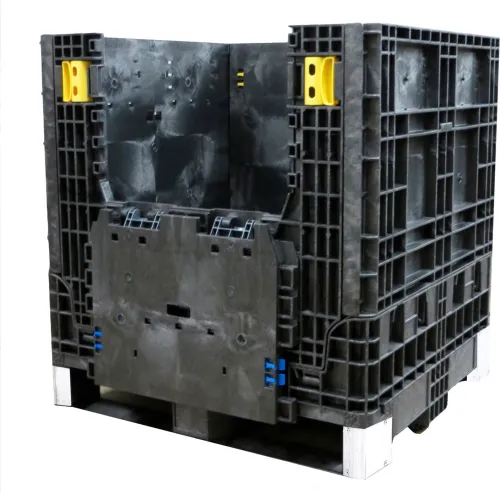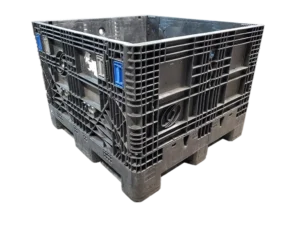The growing demand for used collapsible containers in warehousing sectors
Wiki Article
Why Bulk Containers Are Necessary for Cost-efficient and lasting Transportation
Bulk containers play a crucial duty in contemporary logistics. They promote the effective activity of huge quantities of items, thus maximizing transport processes. This technique not just reduces costs yet additionally minimizes environmental influence through reduced emissions and waste generation. As markets seek even more lasting practices, the fostering of mass containers is ending up being significantly considerable. What implications does this shift hold for future logistics and supply chain monitoring?
The Benefits of Utilizing Mass Containers in Logistics
Mass containers transform logistics by improving performance and sustainability. These containers enable for the transportation of large quantities of goods in a solitary trip, substantially minimizing the variety of journeys required. This not only streamlines operations however additionally lessens labor costs connected with handling, packing, and discharging. On top of that, bulk containers are created to optimize space use within transport automobiles, making certain that more items can be shipped at the same time.The standardization of bulk containers also simplifies the logistics procedure. With uniform dimensions, they can be easily piled and kept, resulting in improved warehouse monitoring. Bulk containers usually feature resilient products that secure materials from damage throughout transportation, thus decreasing product loss and enhancing overall reliability. Therefore, services can experience improved supply chain performance, inevitably leading to increased productivity and customer fulfillment. This combination of factors makes mass containers a vital possession in modern logistics.
Environmental Influence: Minimizing Waste and Carbon Impact
As markets progressively focus on sustainability, the fostering of mass containers has actually become a key method for decreasing waste and lowering carbon footprints. These containers reduce using product packaging materials, such as boxes and plastic, therefore significantly decreasing overall waste generation. By settling shipments, bulk containers enhance transport performance, permitting for more items to be transported per trip. This decrease in journeys straight correlates with lower greenhouse gas discharges, adding to a smaller sized carbon footprint.Moreover, bulk containers can frequently be recycled or reused, further reducing environmental effect. The resilience of these containers guarantees they can hold up against multiple transport cycles, lowering the need for single-use alternatives. used plastic containers. By streamlining logistics and promoting efficient source usage, mass containers not only support sustainable techniques but also encourage sectors to straighten with international ecological goals. Eventually, their implementation reflects a commitment to ecological stewardship and accountable resource administration
Expense Financial Savings: Exactly How Bulk Containers Lower Transportation Expenses
While lots of firms seek methods to improve their profits, making use of bulk containers offers a substantial possibility for decreasing transportation costs. Mass containers take full advantage of the volume of products carried, permitting organizations to deliver larger quantities simultaneously. This effectiveness minimizes the number of journeys required, directly decreasing gas costs and reducing labor expenditures related to loading and discharging.Additionally, bulk containers frequently feature streamlined layouts that maximize space application within transport vehicles. This indicates fewer voids, causing more reliable use offered capacity. The durability of mass containers can reduce the threat of item damage throughout transportation, ensuring and lowering losses that more goods arrive intact.
Enhancing Supply Chain Efficiency With Bulk Storage Space Solutions
Mass storage space options play a crucial function in boosting supply chain effectiveness by enhancing supply management. By consolidating items into less, bigger containers, services can significantly minimize dealing with prices connected with constant transfers and handling. This streamlined technique enables much better tracking and administration of stock, eventually causing enhanced operational performance.Structured Inventory Management
Efficient inventory monitoring is essential for optimizing supply chain procedures, especially when companies embrace bulk storage solutions. These options enable services to keep higher stock degrees while lessening the regularity of replenishment. By settling materials right into mass containers, business can simplify their stock processes, decreasing the intricacy related to tracking numerous smaller sized plans. This technique helps with precise stock matters and improves projecting precision, permitting more enlightened decision-making. Furthermore, bulk storage space services simplify warehouse organization, making it simpler to situate and access items when required. Consequently, companies can achieve a more efficient supply turn over rate, ultimately boosting total supply chain performance and minimizing the likelihood of stockouts or overstock situations.
Decreased Handling Prices
The execution of mass storage space solutions not only improves supply administration however also significantly reduces taking care of prices throughout the supply chain. By consolidating materials right into bulk containers, firms reduce the demand for frequent handling and transfer in between various storage and transportation systems. This method lowers labor prices linked with loading, dumping, and moving smaller packages. Additionally, mass storage space reduces the regularity of shipments, leading to reduced transport costs and lowered gas consumption. Therefore, organizations can maximize their logistics operations, permitting a much more effective allocation of resources. Ultimately, lowered handling costs add to improved overall supply chain efficiency, fostering an environment that sustains both sustainability and financial feasibility.
Flexibility of Bulk Containers Across Different Industries
Although several markets have distinctive requirements for transportation and storage space, bulk containers have arised as a versatile option that fulfills a wide variety of requirements. These containers, ranging from huge bins to specialized containers, can accommodate varied materials, including fluids, granules, and powders. In the farming field, mass containers help with the transportation of fertilizers and grains, while the food and beverage industry utilizes them for components and ended up products. The chemical market counts on bulk containers for securely carrying hazardous products, guaranteeing compliance with security policies. Additionally, building and construction firms benefit from mass containers for delivering aggregates and various other products. Their adaptability expands to different modes of transportation, including trains, trucks, and ships, improving logistical performance. This flexibility not only simplifies procedures across different sectors yet additionally advertises sustainability by reducing product packaging waste and enhancing space en route. Bulk containers play a crucial duty in modern-day supply chain management.Future Fads in Bulk Container Use and Sustainability
The future of mass container use is significantly formed by innovative materials development that boosts sustainability. Additionally, automation in logistics guarantees to enhance operations, reducing waste and improving effectiveness. Embracing round economic climate methods will even more change how bulk containers are created, utilized, and reused, cultivating a much more lasting transportation landscape.Innovative Products Advancement
As sectors significantly prioritize sustainability, ingenious products advancement wholesale containers emerges as a considerable consider improving environmentally friendly transport remedies. Researchers and producers are checking out biodegradable plastics, recycled composites, and light-weight steels to lower ecological influence. These products not just minimize waste yet also enhance fuel performance by decreasing the total weight of containers. Additionally, innovations in clever materials, which can adjust to differing problems, improve the sturdiness and performance of bulk containers. The assimilation of these ingenious materials straightens with circular economy concepts, promoting reuse and recycling. As the need for lasting methods expands, the advancement of such products will certainly play an important function fit the future of bulk container use in logistics and transport.Automation in Logistics
Substantial developments in automation are poised to change logistics and the usage of mass containers, boosting sustainability in transportation. Automated systems, including drones and independent automobiles, are enhancing the motion of bulk containers, decreasing the dependence on typical fuel-powered transport. These innovations optimize routing and loading processes, lessening vacant miles and enhancing gas efficiency. In addition, automated stock monitoring systems enhance monitoring and monitoring of bulk containers, making certain much better source allocation and lowered waste. The integration of the Internet of Points (IoT) allows real-time data analysis, making it possible for proactive decision-making that straightens with sustainability objectives. As automation remains to progress, it is expected to drive better innovations wholesale container usage, eventually sustaining even more sustainable logistics methods and minimizing the ecological influence of transportation.Round Economy Practices
Innovations in automation are setting the stage for a much more integrated strategy to circular economy practices in the domain of bulk container usage. As sectors progressively embrace sustainability, mass containers are being created for long life and reusability. This shift not just reduces waste however also boosts resource performance. Business are adopting approaches website such as closed-loop systems, where used containers are accumulated, reconditioned, and reestablished into the supply chain. In addition, clever modern technologies track container life process, promoting much better management and reducing environmental influence. The partnership in between suppliers, logistics companies, and end-users is necessary in establishing standards for sustainable container use. used bulk containers. Future patterns show a growing emphasis on products that are recyclable and naturally degradable, further reinforcing the round economy's principles wholesale transportation
Frequently Asked Questions
What Products Are Bulk Containers Normally Made From?
Bulk containers are normally created from long lasting products such as high-density polyethylene, steel, aluminum, and cardboard. These materials provide stamina, flexibility, and security, making them appropriate for carrying various products in different sectors successfully.Just how Do I Select the Right Dimension Bulk Container?
Picking the right size mass container entails evaluating the quantity of materials to be transported, thinking about dealing with devices compatibility, and assessing storage space demands. Proper size guarantees efficiency in transport and decreases waste during shipment.Are Mass Containers Reusable or Recyclable?
Mass containers are commonly recyclable, made for several journeys, enhancing sustainability. Numerous can also be recycled, relying on the products utilized. Selecting recyclable options additionally sustains environmental goals and lowers waste in transport techniques.What Security Rules Relate To Bulk Container Transport?
Safety and security regulations for mass container transport consist of conformity with the Department of Transport standards, appropriate labeling of hazardous materials, structural honesty evaluations, and adherence to weight limitations to ensure risk-free handling and avoid mishaps during transit.Exactly How Can Companies Change to Using Bulk Containers Effectively?
Organizations can change to bulk containers by evaluating present logistics, training staff on handling, investing in ideal tools, optimizing stock administration, and working together with vendors to guarantee compatibility and effectiveness throughout the supply chain.
As sectors significantly prioritize sustainability, the fostering of mass containers has arised as a vital technique for decreasing waste and reducing carbon footprints. By combining materials into bulk containers, business can enhance their supply processes, lowering the intricacy associated with tracking multiple smaller packages. As industries progressively focus on sustainability, ingenious products advancement in mass containers emerges as a considerable factor in enhancing green transport remedies. Automated systems, including drones and autonomous vehicles, are streamlining the movement of bulk containers, minimizing the dependence on typical fuel-powered transport. Additionally, automated supply monitoring systems improve tracking and tracking of mass containers, making sure better source allocation and lowered waste.
Report this wiki page